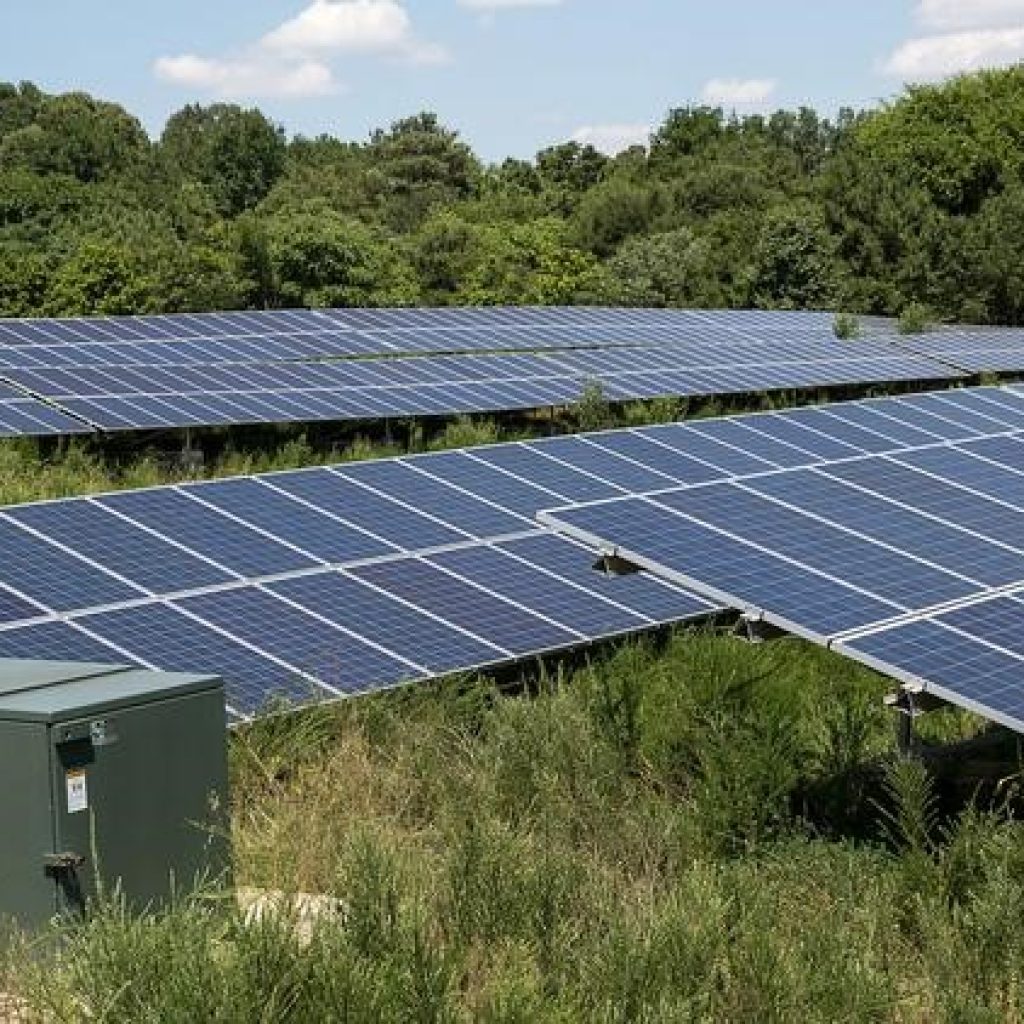By: Kristin Sequeira, Walt Whitman High School
Have you noticed an increase in the number of solar panels in Bethesda in the past few years? Chances are, you probably have. In 2018, fossil fuel emissions in the United States rapidly increased by 2.7%, which is a greater increase than ever before in history. As a result, people have started turning to renewable energy so they can make an impact in their everyday lives. Solar energy has become a popular alternative for homeowners and businesses, especially in the Bethesda area. Solar panels help people save money, have a small carbon footprint, and help homeowners and businesses become self-reliant.
How does solar energy work?
Solar panels allow for photons to knock electrons free from atoms, generating a flow of electricity. This DC energy is converted to AC energy by an inverter and makes the energy readily available for use in homes and businesses. While solar panels generate the most energy in direct sunlight, they still remain a viable source of energy when it is cloudy. Solar panels are typically placed on the roof of the building that is being supplied with the energy. People can also participate in net metering, where solar energy system owners are credited for any extra energy they add back into the grid (Click the link to check out the cool graphic, https://es-cms-prod.s3.amazonaws.com/filer/42/ef/42ef6f7b-0cc5-4bff-a6aa-544322e76a26/net-metering-animation.gif ) However, many people do not have rooftop access and therefore can’t participate in traditional solar energy methods. Despite this, there is still a growing demand for solar energy in the Bethesda area. The number of households in Bethesda is projected to increase by 28% in the next 25 years, and many of those families will live in apartments.

How can people without access to solar panels have solar energy?
Solar panels on the roofs of buildings aren’t the only source of solar energy that is gaining traction. In addition to traditional solar panels, people are coming up with creative solutions to provide all types of homeowners and businesses with solar energy. Local companies such as Neighborhood Sun based in Silver Spring have begun offering alternatives to people who can’t have solar panels on their roof. They find local community solar projects in your area, and you buy a “block” or “share” of the solar project that covers the majority of your energy use. Power produced by the solar project flows directly into the electricity grid, providing solar energy without installing anything onto the site itself.I interviewed Gary Skulnik, founder and CEO of Neighborhood Sun, on his perspectives on communal solar energy.
- What has been the rate of growth of subscribers over the past few years?
We only started marketing this past summer, but we’ve already had hundreds of new enrollments. Bethesda has been one of the biggest growth areas for us.
- Do you think this subscription method will outpace current common solar energy methods?
Yes, because most people can’t get rooftop solar for various reasons. In fact, about 80% of the market can’t get rooftop solar. So, a subscription to a community solar project that offers the same benefits as rooftop without having to install anything is very appealing.
- Is Neighborhood Sun going to partner with any new businesses in the future?
Yes, we are constantly on the lookout for new opportunities to partner, especially with businesses that share our environmental and ethical values.
- What do you see for the future of solar energy, and how do you plan for Neighborhood Sun to take part in this?
I think community solar is the next big driver in the solar energy market. We want to be a central player in the Maryland market and then expand to other states.
- Why do you think people in Bethesda are largely switching to solar energy?
The main driver for switching is people want to do something to help fight climate change and clean our air. They read the news and see images of the horrible damage that’s already happening from climate change and it can feel overwhelming. Switching to solar energy is one direct concrete step people can take to be part of the solution while saving money at the same time.

(Neighborhood Sun’s communal solar panels)
There have been several causes for the increased presence of solar energy in the Bethesda area. The combination of increased awareness over the benefits of solar panels and communal solar energy plans have aided in this increase. There are other potential causes as well, including House Bill 1087 passed in 2015 which has allowed for community solar projects to find success. In addition, the Maryland clean energy grant has provided an incentive for people to rely on solar energy since it rebates up to $1000 of solar systems installed. Maryland’s return on investment for installing solar panels is one of the best in the nation. Whether it’s on-site or communal solar energy, people have started going solar because of the numerous benefits provided by both the state and communal solar companies.
References
Beaudet, A. (2016, February 16). Why do people go solar? Retrieved December 20, 2018, from https://www.altestore.com/blog/2016/02/5-reasons-why-people-go-solar/#.XEC8jlxKi00
Bethesda downtown plan [PDF]. (n.d.). Retrieved from http://montgomeryplanning.org/wp-content/uploads/2016/12/BDP-Planning-Board-Draft_lowres2.pdf
Bethesda Maryland solar panel installation by MSSI. (2018, March 24). Retrieved January 15, 2019, from Maryland Solar Solutions, Inc. website: https://blog.marylandsolarsolutions.com/bethesda-maryland-solar-panel-installation-by-mssi/
House Bill 1087 [PDF]. (n.d.). Retrieved from http://mgaleg.maryland.gov/2015RS/bills/hb/hb1087t.pdf
How does community solar work? (n.d.). Retrieved January 5, 2019, from Neighborhood Sun website: https://neighborhoodsun.solar/how-it-works/
Kraut, A. (2016, April 28). Silver Spring man hopes to bring “community solar” to Montgomery county. Retrieved December 18, 2018, from Bethesda magazine website: https://bethesdamagazine.com/bethesda-beat/business/silver-spring-man-hopes-to-bring-community-solar-to-montgomery-county/
Maryland state energy profile. (n.d.). Retrieved January 15, 2019, from U.S. energy information administration website: https://www.eia.gov/state/print.php?sid=MD
Net metering. (n.d.). Retrieved January 6, 2019, from Solar energy industries association website: https://www.seia.org/initiatives/net-metering
Net metering for home solar panels. (n.d.). Retrieved January 10, 20





